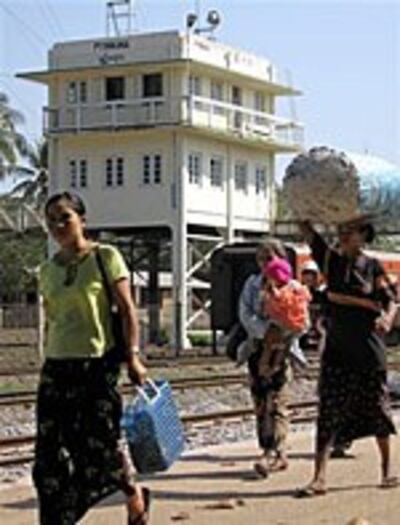
BANGKOK—Burma’s new capital city lacks schools, housing and other critical services for relocated civil servants and their families, with some officials resigning in protest at the move, according to a government official who fled the country.
“Those who are not able to go abroad have no choice, but if the government allowed resigning most of them would have gone,” the official said on condition of anonymity. He asked that neither the ministry in which he once worked nor the Asian country where he is now staying be identified.
Officials throw keys down and run
Most ministries are scheduled to start operations from the new capital this week, in a remote jungle town near Pyinmana, about 600 kilometres (370 miles) north of Rangoon, the official said.
The junta announced in November that it was relocating the capital from Rangoon because Pyinmana was a more strategic venue.
Civil servants have been relocating in groups, the official said, but some simply left the keys to their new offices on their desks and quit without notice, after their resignation letters were turned down by their ministries, he said. “I am one of them. I did it to escape," he said.
Housing conditions for civil servants in the new capital were “deplorable,” the official said, citing “a mudslide down to the temporary huts where we have to take shelter… The jungle surrounding the place is also [a] malaria risk area."
Refugee camp conditions
"It is just like being interned in a camp...When the sun is out it is dry, but when it rains it becomes muddy and the mud flows into our huts," he added. "No running water is available, no drainage system exists. As you know, everything was carried out without any plan at all."
It is just like being interned in a camp...When the sun is out it is dry, but when it rains it becomes muddy and the mud flows into our huts... No running water is available, no drainage system exists.
"I think perhaps that conditions at the refugee camps on the Thai-Burma border would be better than that."
Many civil servants were unhappy with the short notice they received about the impending move and were afraid because they knew most of the construction workers in the area suffered from malaria, the official said. The area also lacked schools for officials’ children and a hospital, he said.
The junta, which has run the country since 1962, has said it needs a centrally located “command and control center,” although some analysts believe the move was prompted by fears of possible internal unrest.
The ruling State Peace and Development Council quietly began building the new capital more than three years ago by first building facilities and bunkers for top officials.
Original reporting by Thein Htike Oo of RFA’s Burmese service. Written in English by Sarah Jackson-Han and edited by Luisetta Mudie.
